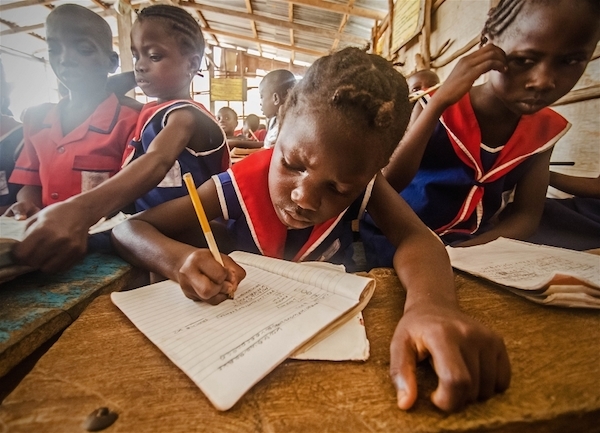
“Soweto children were killed protesting their right to education – we have to keep the fight going”
Barriers to education, Global Youth Ambassadors, Right to education
On Day of the African Child, Global Youth Ambassador Ousmane Ba remembers the South African students killed in 1976 and how we must honour them by seeking a better future for all children.
As a child, I learned of June 16. The day calls for us to remember the 1976 South Africa uprising, during which black school children in Soweto were brutally killed while protesting their right to quality education.
Years later as a teenager, I watched the movie Sarafina – a mere recreation of what happened that day, with graphic imagery of students being brutally killed by the same people who were supposed to protect them.
I am not sure I understood the movie then but it stuck with me and left me with a seemingly simple and yet unanswered question – why did these children have to die because of their desire for education?
Those South African children marched because they wanted a better education. They marched because they believed education would relieve them from an unjust society.
They marched because they believed education would pull them back from the shackles of poverty. They marched because they believed education would ultimately give them a better South Africa.
As I ponder over their courageous move, I realise their protest is just not about education alone. It was about the rights of African children to a better future.
And since then, it is fair to say some progress has been made towards children’s rights and education. Today children have a platform to echo their needs, concerns and aspirations. Their right to education is widely recognised and enshrined in the modern structure of society.
The Day of the African Child provides a platform for international organisations, governments and civil society to strengthen their ongoing commitment towards improving the situation of children in Africa. But it also puts the struggle for education in critical perspective.
Today many African children continue to suffer and languish in poverty. Millions of them are still out of school.
According to UNESCO, Africa is home to 43% of the world’s out-of-school primary-age children and most of the 30 million children who are out of school in sub-Saharan Africa will never go to school.

In Sierra Leone, quality education has steadily declined and many children do not have access to basic amenities such as food and shelter, let alone have the opportunity to go to school.
There is no doubt leaders in governments and other high-powered positions should double their efforts towards children’s education and ensure a better future for them.
But, make no mistake, the future of the next generation is also on the shoulders of the youth. As child, coming from school every day, I would often see children doing pitty trade on the street and begging for food.
I would ask my mother why those children were begging on the street and not in school.
“It’s complicated,” she would say. “But that’s why you are going to school, to make their lives better tomorrow.”
It is upon us, the youth, to keep pressure on our leaders to act immediately and ensure that every African child gets a decent shot at a quality education.
Today we celebrate the courage of those children in Soweto and remember their tragic deaths. Most importantly, we reflect on the purpose of their protests.
The best way we can honour them is to keep the fight going. We must muster the same courage and bravery to stand up our authorities and demand our rights.
We must mobilise our voices and seek a better future for our children. If there is one thing we should take from that protest is that young people should speak up about issues that affect their communities and not give in to the status quo.
Come what may, we must never relent in our efforts to ensure quality education for all children.
More news

